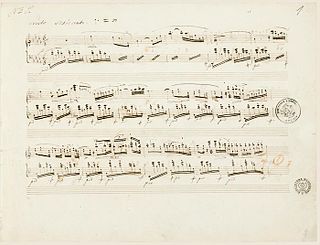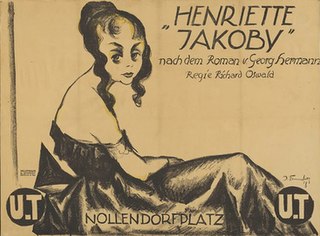Related Research Articles

Frédéric François Chopin was a Polish composer and virtuoso pianist of the Romantic period, who wrote primarily for solo piano. He has maintained worldwide renown as a leading musician of his era, one whose "poetic genius was based on a professional technique that was without equal in his generation".

Hans Walter Conrad Veidt was a German film actor who attracted early attention for his roles in the films Different from the Others (1919), The Cabinet of Dr. Caligari (1920), and The Man Who Laughs (1928). After a successful career in German silent films, where he was one of the best-paid stars of UFA, he and his new Jewish wife Ilona Prager were forced to leave Germany in 1933 after the Nazis came to power. The couple settled in Britain, where he took British citizenship in 1939. He appeared in many British films, including The Thief of Bagdad (1940), before emigrating to the United States around 1941, which led to his being cast in what may be his best remembered role as Major Strasser in Casablanca (1942). This was his last film role to be released during Veidt's lifetime.

The Nocturnes, Op. 9 are a set of three nocturnes for solo piano written by Frédéric Chopin between 1831 and 1832, published in 1832, and dedicated to Madame Marie Pleyel. These were Chopin's first published set of nocturnes. The second nocturne of the work is often regarded as Chopin's most famous piece.
Spring Waltz is the name of a soundtrack in 2006 for the KBS drama Spring Waltz.

The Nocturnes, Op. 27 are a set of two nocturnes for solo piano composed by Frédéric Chopin. The pieces were composed in 1836 and published in 1837. Both nocturnes in this opus are dedicated to Countess d'Appony.

The Nocturnes, Op. 32 are a set of two nocturnes for solo piano written and published by Frédéric Chopin in 1837. The nocturnes are dedicated to Madame Camile de Billing, and were his ninth and tenth nocturnes published.

Frédéric Chopin wrote 21 nocturnes for solo piano between 1827 and 1846. They are generally considered among the finest short solo works for the instrument and hold an important place in contemporary concert repertoire. Although Chopin did not invent the nocturne, he popularized and expanded on it, building on the form developed by Irish composer John Field.

Lady Hamilton is a 1921 German silent historical film directed by Richard Oswald and starring Liane Haid, Conrad Veidt and Werner Krauss. The film depicts the love affair between the British Admiral Lord Nelson and Lady Emma Hamilton. It was based on two novels by Heinrich Vollrath Schumacher. A copy of the film exists in a Russian film archive.
The Love Affairs of Hector Dalmore is a 1921 German silent drama film directed by Richard Oswald and starring Conrad Veidt, Erna Morena, and Kitty Moran. It premiered in Berlin on 22 February 1921.
The Clever Fox is a 1926 German silent comedy film directed by Conrad Wiene and starring Hans Brausewetter, Clementine Plessner and Werner Pittschau. The film premiered in Berlin on 4 March 1926. It is based on the 1906 novel of the same title by Walter Bloem.
Clementine Plessner was an Austrian stage and film actress. Plessner worked in the German film industry and appeared in over sixty films, mostly during the silent era. Plessner featured in Richard Oswald's enlightenment film Different from the Others and F.W. Murnau's Journey into the Night.

Should We Be Silent? is a 1926 German silent drama film directed by Richard Oswald and starring Conrad Veidt, Walter Rilla and Henri De Vries. It was made at the Johannisthal Studios in Berlin. The film exists only in fragmentary form.

Lucrezia Borgia is a 1922 German silent historical film directed by Richard Oswald and starring Conrad Veidt, Liane Haid, Paul Wegener, and Albert Bassermann. It was based on a novel by Harry Sheff, and portrayed the life of the Renaissance Italian aristocrat Lucrezia Borgia (1480–1519). Botho Hoefer and Robert Neppach worked as the film's art directors, designing the period sets needed. It was shot at the Tempelhof Studios in Berlin. Karl Freund was one of the cinematographers. Famed French director Abel Gance remade the film in 1935.
The Story of Dida Ibsen is a 1918 German silent drama film directed by Richard Oswald and starring Anita Berber, Conrad Veidt and Werner Krauss. It is an adaptation of Margarete Böhme's 1907 novel of the same title, a sequel to her best-known work The Diary of a Lost Girl. It was one of a series of enlightenment films made by Oswald during the period.
Manolescu's Memoirs is a 1920 German silent film directed by Richard Oswald and starring Conrad Veidt, Erna Morena and Lilli Lohrer.

Henriette Jacoby is a 1918 German silent film directed by Richard Oswald and starring Mechthildis Thein, Conrad Veidt and Leo Connard. It is the sequel to Jettchen Gebert's Story. It is a lost film.

Jettchen Gebert's Story is a 1918 German silent film directed by Richard Oswald and starring Mechthildis Thein, Conrad Veidt and Leo Connard. It is a lost film.

Diary of a Lost Woman is a 1918 German silent drama film directed by Richard Oswald and starring Erna Morena, Reinhold Schünzel, and Werner Krauss. The rising star Conrad Veidt also appeared. It is now considered a lost film. It was remade at the end of the silent era as Diary of a Lost Girl by Georg Wilhelm Pabst.

The Night of Decision is a 1931 American drama film directed by Dimitri Buchowetzki and starring Conrad Veidt, Olga Chekhova, and Peter Voß. Based on the 1928 play The General by Lajos Zilahy, it is also known by the alternative title of Der General.
Slaves of Love is a 1924 German silent drama film directed by Carl Boese and starring Ellen Kürti, Cläre Lotto, and Olga Engl.
References
- 1 2 3 4 5 Soister, John T. (2002). Conrad Veidt on Screen: A Comprehensive Illustrated Filmography. Jefferson, North Carolina and London: McFarland & Company. p. 62. ISBN 978-0-7864-4511-0.